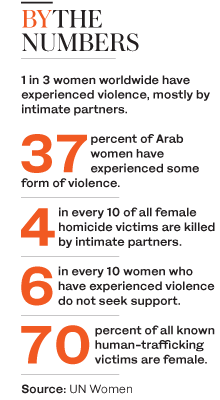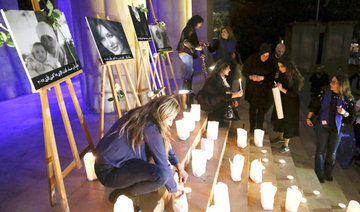BEIRUT: Arab women and their protection took center stage at a regional workshop held by the UN in Beirut this week.
Held on Tuesday and Wednesday at the United Nations House in the Lebanese capital, the workshop to support women in the Arab region was organized by the UN’s Economic and Social Commission for Western Asia (ESCWA), the UN Entity for Gender Equality and the Empowerment of Women (UN Women) and the Arab League.
The aim was to address violence against women and highlight the role of international and regional bodies specializing in women’s issues, as well as their impact on the development of policies, strategies, national laws and standard services to address the issue.
“Violence against women is one of our key pillars, and we chose the topic based on the request from our Arab member states,” said Mehrinaz El-Awady, director at the ESCWA Center for Women. “Most of our work is related to eliminating violence. We do studies and a lot of capacity-building on certain topics.”
The center conducted a number of studies on the topic this year, adding to its seven years of cumulative work on the issue. The studies are complemented by workshops to fill the knowledge gap. 
“There are a lot of initiatives done by national women’s machineries, which are the government offices, departments, commissions or ministries that provide leadership and support to government efforts to achieve greater equality between women and men, but they are not all aligned with international institutions, policy and gender equality in general,” El-Awady said. “There are specific requirements for legislation on violence against women, and we have six Arab countries that have done this legislation, yet we need more alignment on these legislations, to have a broader definition on violence against women.”
She spoke of the potential in Arab countries to eliminate violence, which the UN wishes to build on. “We’re introducing international instruments on violence against women and key pillars that should be legislation on the topic,” El-Awady said.
“It should cover prevention, protection, prosecution and rehabilitation, and we’re picking some of the examples of countries that have done legislation, allowing them to present the newly developed laws so other countries that haven’t had a law would be encouraged to follow the same path.”
Of ESCWA’s 22 member states, countries that are considered to have adequate laws in place include Jordan, Saudi Arabia, Bahrain, Tunisia, Morocco and Lebanon. In 2013, Saudi Arabia passed legislation to protect women, children and domestic workers against domestic abuse. It was followed earlier this year by an anti-harassment law.
Other countries are said to deal with violence against women under the penal code, which ESCWA is advocating against. “When you have violence against women in a penal code, it loses the privacy,” she added. “It’s not violence from an intimate partner.”
According to UN Women, one in three women worldwide have experienced physical or sexual violence at least once, mostly by an intimate partner. In some countries, that figure is as high as 70 per cent. Globally, almost four in every 10 female homicide victims are killed by intimate partners.
Violence against women has risen in the past few years in the region, which, according to the World Bank, has the lowest number of laws protecting women from domestic violence in the world. UN Women estimates 37 per cent of Arab women have experienced violence, with indicators that the percentage might be higher.
“The region has had a prevalence of violence against women, and it’s one of the things we’re trying to support countries (in),” El-Awady said.
“We hope Arab member states are more sensitive to the requirement of legislation on violence against women and start the consideration of having a protection order with the legislation to complement it. There’s a momentum and Arab countries are now more alert — it’s a phenomenon that requires attention from them.”
Women and girls make up 70 per cent of all known human-trafficking victims. Adult women constitute 50 percent of the total number of trafficked people, while two in three child victims of human trafficking are young girls.
 Rapists are often shown leniency or even acquitted in the Arab region if they marry their victims. In Morocco, Article 475 of the penal code, which allowed rapists to avoid prosecution if they marry their victims, was repealed in 2014 following the suicide of a rape victim who was forced to marry her rapist. Today, 700 million women have been married under the age of 18, and 14 percent of Arab girls marry under the age of 18.
Rapists are often shown leniency or even acquitted in the Arab region if they marry their victims. In Morocco, Article 475 of the penal code, which allowed rapists to avoid prosecution if they marry their victims, was repealed in 2014 following the suicide of a rape victim who was forced to marry her rapist. Today, 700 million women have been married under the age of 18, and 14 percent of Arab girls marry under the age of 18.
“Violence against women has multiple consequences, at the individual level, within the family, community and wider society,” said Manal Benkirane, regional program specialist at UN Women’s Regional Office for Arab States. “It can lead to fatal outcomes and have a significant burden on the economy. Despite the ongoing efforts to eliminate violence against women and girls in the region, its prevalence and social acceptance remain high.”
She stressed the importance of having enabling legislative frameworks to change the social norms and acceptance of violence, and to ensure women’s access to services that meet their needs. “Otherwise, women in the region end up being violated twice, first when they are subjected to assault, and second when they are denied their right to care and support,” she said. “This workshop offers the space for participating countries to share their experiences, achievements but also challenges they faced in addressing violence in the region.”
More than six in every 10 women survivors of violence refrain from asking for support or protection. The remaining ones who speak up turn to family and friends.
Globally, the total direct and indirect costs of violence against women for countries are estimated to be as high as 1 to 2 percent of their gross national product, which amounts to millions of dollars worldwide.
“Violence against women (has) become a critical issue in the Arab region,” said Shaza Abdellateef, head of women in the women, family and childhood department at the Arab League’s social affairs sector.
“This is especially pronounced under the recent circumstances that some Arab countries suffer from, with the spread of armed conflicts, refugees and the increase of violence against women, including domestic violence. It is one of the most important issues in the Arab region today.”



























